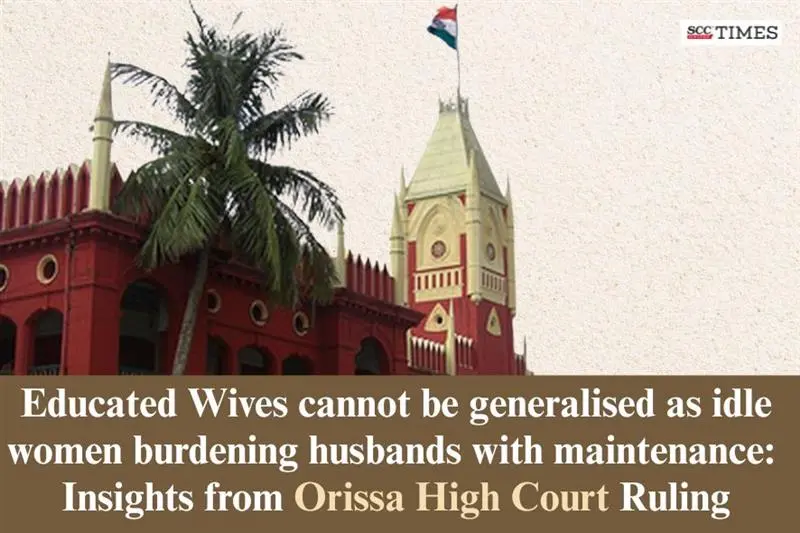Orissa High Court: In the present revision, the petitioner husband sought to challenge the order passed by the Family Court, which had allowed the petition filed under Section 125 of Criminal Procedure Code, 1973 (‘CrPC’) by the opposite parties, his wife (OP 1) and daughter (OP 2), for maintenance at Rs 5,000 each per month. The husband alleged that the wife was earning more than him and had voluntarily deserted him without any cause, and therefore was not entitled to maintenance. A Single Judge Bench of G. Satapathy, J., while dismissing the revision, emphasised that it could not have universal application in all cases that a wife with high qualification was intentionally avoiding work to harass the husband and saddle him with liability, unless there was material evidence to that effect.
Background:
The case arose from a dispute between the husband, his wife, and their daughter. Their marriage was solemnised on 19-01-2001 as per their caste and customs, and they were blessed with a daughter thereafter.
Due to allegations of further dowry demands, the wife reported the matter to Mahila Sammittee, Bargarh. The husband allegedly deserted the wife and daughter in 2004. He later filed a case for dissolution of marriage, which was decreed ex-parte on 08-03-2007. The wife attempted to set aside the decree under Order IX Rule 13 of the Civil Procedure Code, 1908 (‘CPC’), but her petition was dismissed for default on 02-02-2012. She subsequently filed another petition under Section 151 CPC to challenge that dismissal.
Meanwhile, the wife and daughter filed a petition under Section 125 CrPC seeking maintenance. They claimed the husband was an Advocate earning Rs 20,000 per month, with additional income of Rs 1 lakh per month from a Hero Honda showroom and Rs 50,000 per month from house rent.
The husband admitted the relationship but denied liability, asserting that the wife was well-qualified (MA, LLB), earning more than him as a LIC agent and private school teacher, and owned property in Bargarh. He claimed she had voluntarily deserted him and was not entitled to maintenance. He also stated he had no rental income and was financially burdened by his dependent mother and younger brothers.
After hearing both sides, the Family Court, Bargarh directed the husband to pay Rs 5000 per month each to his wife and daughter (total Rs 10,000 per month), effective from 06-03-2012. Aggrieved by this order, the husband filed the present revision.
Analysis and Decision:
The Court noted that the husband had taken a technical plea of desertion to avoid liability for maintenance. However, since it was not disputed that the husband had married a second time, the wife had a valid excuse in law to live separately, as mandated in the explanation to Sub-Section (3) of Section 125 CrPC.
The Court examined Section 20(3) of the Hindu Adoptions and Maintenance Act, 1956 (‘HAMA’) and observed that it made it obligatory on a Hindu to maintain his or her aged or infirm parents, or a daughter who was unmarried and unable to maintain herself out of her own earnings or other properties. The Court further noted that one of the apparent conflicts between Section 125 CrPC and Section 20 of the HAMA was that the daughter, on a literal interpretation of the provision of Section 125 CrPC, would cease to claim maintenance upon attaining majority, but she could claim maintenance under HAMA on the satisfaction that she was unable to maintain herself.
The Court observed that the Trial Court, on analysis of evidence, had considered the wife as an Advocate at Bargarh Bar but noted that all Advocates did not have sufficient income. The Court held that the income of Advocates could not be generalised or assumed to be handsome. Even assuming the wife had some income, no document or evidence was produced by the petitioner to establish her particular income. Considering the wife’s affidavit stating monthly expenses of Rs 7000 to Rs 8000, the Court found it probable in the present market as no evidence was tendered to establish her income. Though her status as an Advocate was not disputed, the Court held that the wife and children were required to be maintained in law, commensurate to the standard of living of the husband/father.
On analysis of admitted facts and Income Tax returns for 2016—2017, 2017—2018, and 2018—2019, the Court concluded that the husband had sufficient income and was liable to provide maintenance to his first wife and daughter, who had no sufficient means to maintain themselves. The Court emphasised that it could not have universal application in all cases that a wife with high qualification was intentionally avoiding work to harass the husband and saddle him with liability, unless there was material evidence to that effect. The Court further noted that in absence of any evidence of income or prospect to earn, it would be unfair to say that wives were breeding a class of idle women to burden their husbands.
The Court found that the wife and unmarried adult daughter couldn’t support themselves and were legally entitled to maintenance from the husband, where the daughter’s right to maintenance would continue only until she got married. The Court further considered the present-day market cost and standard of living of the wife and daughter, which must commensurate with the standard of living of the husband.
The Court, thus held that the grant of maintenance at Rs 5000 per month each was neither exorbitant nor excessive. The Court also noted that although the wife was an Advocate, she was not considered a serious practitioner, and no evidence had been produced to establish her income. The Court, therefore dismissed the revision and confirmed the judgment dated 23-12-2019 passed by the Family Court, Bargarh.
[G. Debendra Rao v. G.Puspa Prabha Rao, 2025 SCC OnLine Ori 3571, decided on 16-09-2025]
Advocates who appeared in this case:
For the Petitioner: B.P.B. Bahali, Advocate
For the Opposite Party: A. Pradhan, Advocate


